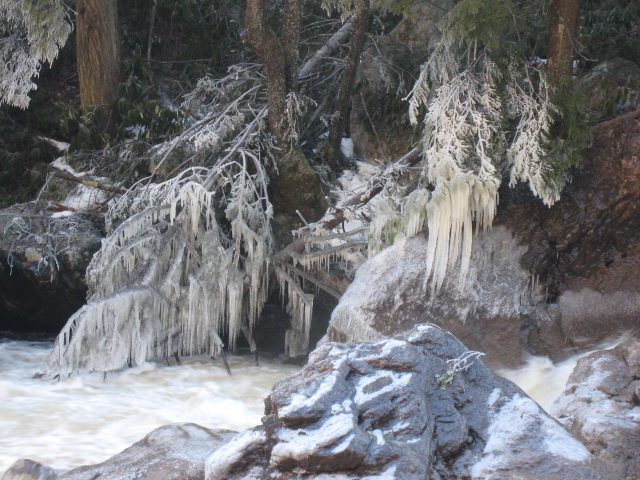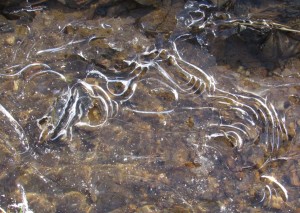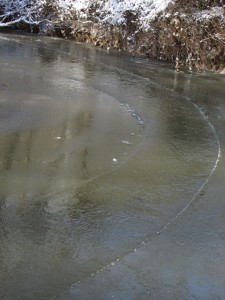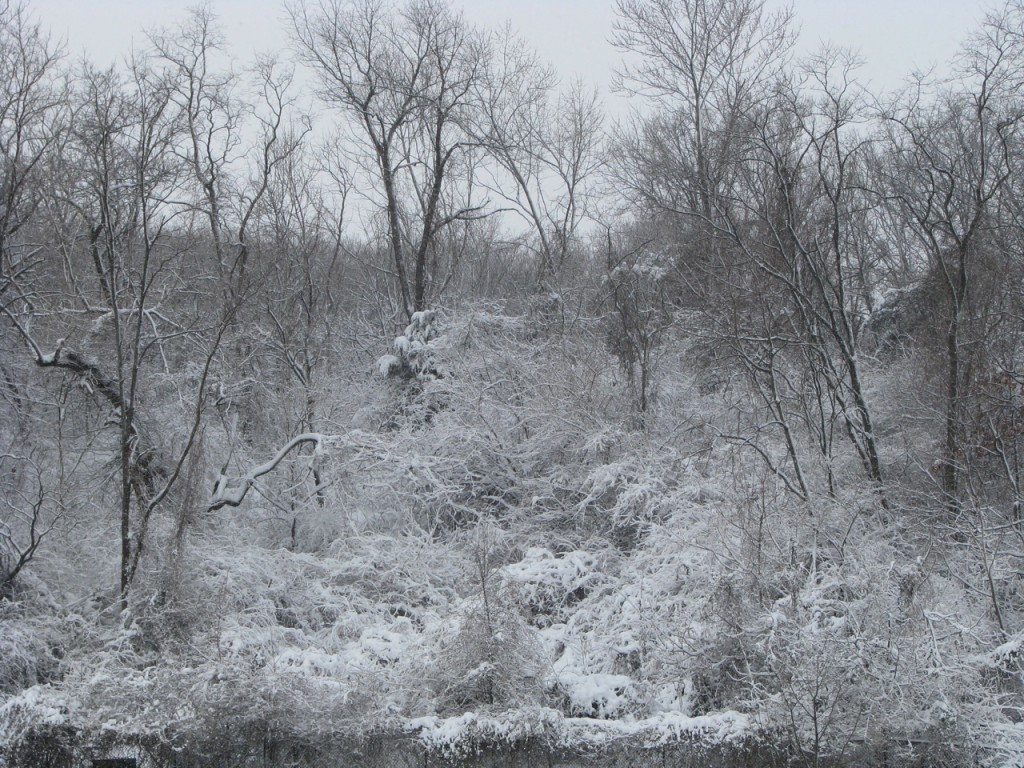It’s cold tonight–really cold. So naturally I’m thinking about ice. 
Ice, as everyone learns early on, is the solid existence of water. It’s what happens when H2O molecules stop sliding and start sticking, when each negatively charged oxygen bonds distantly to one or more neighboring hydrogens. Ice has an unusual, airy crystal framework, less dense than its liquid form, and capable of endless permutations: snowflake, hailstone, glacier, iceberg, clinking cube in a martini glass, glassy sheet on a lake, crystalline cloud, icicle.
Liquid is water in motion: it falls, flows, gushes, seeps, swirls, sprays, wells up and sinks. It, like us, is restless, seeking. Ice too can fall, and flow, glacially. It heaves and cracks; it drifts and melts. But mostly, it rests – sometimes for hundreds, thousands of years.
Once, we too rested. The season for that was known as winter. Snow settled on the earth during this time, and we took our cues from it. The land couldn’t be worked and travel became difficult, so we  stayed in, lay low, turned contemplative, read, made music, were quiet. Ice fishermen, it seems to me, still follow the logic of winter. They put a bucket on the ice, drill a hole, and sit.
stayed in, lay low, turned contemplative, read, made music, were quiet. Ice fishermen, it seems to me, still follow the logic of winter. They put a bucket on the ice, drill a hole, and sit.
Now we have abandoned our rest; our work knows no season. Electrons flow and combustion engines cycle with insensible constancy. Snow becomes a manageable inconvenience, to be shoveled aside or melted with salt. Planes are de-iced and fly; ships break through bergs. We keep moving.
The net result of all this motion may be to eventually rid the planet of ice. It has happened before. Fifty-six million years ago, during a strange period called the Paleocene-Eocene Thermal Maximum, the world was so warm that crocodiles wandered the poles. Sea levels were hundreds of feet higher. Of every million air molecules, perhaps two thousand were carbon dioxide (only 400 are now). We are a long way from an ice-free planet, but if we burn an appreciable fraction of our remaining fossil fuels reserves, we could get there.
What would that world be like? Polar bears, penguins, and many less charismatic species that also make their living on ice would go extinct. So would entire human cultures—the Inuits, for example, as well as the Lapplanders and native people of Siberia. Humans living in temperate places would lose many of the activities that give life meaning. 
The planet would also lose one of its ways to cool itself. Ice reflects nearly all the sunlight that hits it. Open water and land absorb much more of that light, and warm accordingly. This is what’s known as a positive climate feedback. Unfortunately, positive feedbacks seem to be much easier to find than negative ones.
Without polar ice, it has become clear, the planet’s climate would be unrecognizable. Atmospheric circulation is driven by the difference in temperature between a hot equator and frigid poles. The poles are warming much faster than the equator now. If the Arctic Ocean becomes the temperature of water off California’s coast, as it apparently was in the PETM, weather patterns would be very different. Already, some scientists believe the loss of Arctic sea ice is affecting the jet stream, which delivers rain to the temperate regions.
The paleoclimatic record is full of drastic regional climate shifts resulting from far smaller perturbations than a total loss of ice. During the last ice ages, for instance, positive feedbacks amplified variations in Earth’s orbit to send ice furling and unfurling across continents. Glaciers marched down into the lower 48 and the mid-Atlantic was covered in spruce forest. It’s worth noting that the average global temperature at this time was only a few degrees Celsius less than it is now. What will happen if we go a few degrees in the other direction?
I think about these things, but they are centuries off—though how many centuries is unclear, as polar ice keeps melting faster than expected. It’s safe to say that in my lifetime, we will continue to have  winter, though it may become a shadow of itself. If it does, I don’t think most people will mind. A recent New York Times story reported that Florida’s population is about to overtake New York’s, as both immigrants and internal migrants choose the sunshine state over its chiller cousin (apparently not minding that a significant part of Florida could be under water in a century). New York governor Andrew Cuomo petulantly said he prefers to have seasons.
winter, though it may become a shadow of itself. If it does, I don’t think most people will mind. A recent New York Times story reported that Florida’s population is about to overtake New York’s, as both immigrants and internal migrants choose the sunshine state over its chiller cousin (apparently not minding that a significant part of Florida could be under water in a century). New York governor Andrew Cuomo petulantly said he prefers to have seasons.
I do too. I appreciate the variety of bodily sensations and experiences I get in a temperate climate. I like that I can ski in the winter and swim in the summer. I also feel I’m in a shrinking minority. In a world governed by the logic of motion, ice and snow have become problems that we figure out how to solve. We have become all too good at it.
(photos of winter in West Virginia, Maryland, and Washington, DC; all by the author)
A project named Climate Wisconsin made some beautiful videos of how climate change might affect life in that chilly state. Check them out.